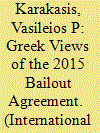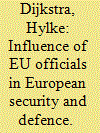| Srl | Item |
| 1 |
ID:
186128


|
|
|
|
|
| Summary/Abstract |
In July 2015, after intense negotiations with its creditors, Greece received a bailout in exchange for fiscal restraint. The coalition government at that time, led by the left-wing SYRIZA party, elected on the basis of an anti-austerity platform, eventually accepted the prevalent austerity frames of the creditors. Through the aid of Q-method, an analysis of Greek opinion leaders’ views of the negotiation highlights that this outcome can be explained in two different ways. The first posits that the ideological overtones that ruling SYRIZA injected in its negotiation strategy exhibited a lack of socialisation and undermined Greece’s already weak bargaining position. The second focuses on the institutional status quo bias in the Eurogroup in Germany’s favour, which discourages any change in the Eurozone. These two views may have partly been influenced by questions of political accountability.
|
|
|
|
|
|
|
|
|
|
|
|
|
|
|
|
| 2 |
ID:
114209


|
|
|
|
|
| Publication |
2012.
|
| Summary/Abstract |
European Union (EU) foreign policy has long been considered the domaine réservé of the member states. This article challenges such conventional state-centered wisdom by analyzing the influence of the Brussels-based EU officials in the Common Security and Defence Policy. Using four case studies and data from 105 semi-structured interviews, it shows that EU officials are most influential in the agenda-setting phase and more influential in civilian than in military operations. Their prominence in agenda-setting can be explained by their central position in the policy process. This allows them to get early involved in the operations. The absence of strong control mechanisms and doctrine in civilian crisis management gives them opportunities to affect civilian missions. Finally, EU officials direct civilian operations from Brussels, whereas the command of military operations is with the member states and NATO.
|
|
|
|
|
|
|
|
|
|
|
|
|
|
|
|